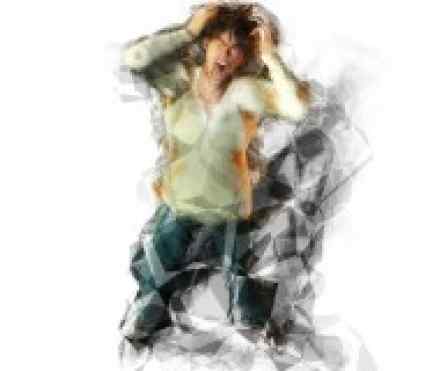
What is it?
Schizophrenia is a group of severe brain disorders in which people interpret reality abnormally. Schizophrenia may result in some combination of hallucinations, delusions and disordered thinking and behavior. The ability of people with schizophrenia to function normally and to care for themselves tends to deteriorate over time.
Contrary to some popular belief, schizophrenia isn't split personality or multiple personality. The word "schizophrenia" does mean "split mind," but it refers to a disruption of the usual balance of emotions and thinking.
Schizophrenia is a chronic condition, requiring lifelong treatment.
Symptoms
The symptoms of schizophrenia also can be attributed to other mental illnesses, and no one symptom can pinpoint a diagnosis of schizophrenia. In men, schizophrenia symptoms typically start in the teens or 20s. In women, schizophrenia symptoms typically begin in the 20s or early 30s. It's uncommon for children to be diagnosed with schizophrenia and rare for those older than 40.
Signs and symptoms of schizophrenia generally are divided into three categories — positive, negative and cognitive.
Positive symptoms
In schizophrenia, positive symptoms reflect an excess or distortion of normal functions. These active, abnormal symptoms may include:
- Delusions. These beliefs are not based in reality and usually involve misinterpretation of perception or experience. They are the most common of schizophrenic symptoms.
- Hallucinations. These usually involve seeing or hearing things that don't exist, although hallucinations can be in any of the senses. Hearing voices is the most common hallucination among people with schizophrenia.
- Thought disorder. Difficulty speaking and organizing thoughts may result in stopping speech midsentence or putting together meaningless words, sometimes known as "word salad."
- Disorganized behavior. This may show in a number of ways, ranging from childlike silliness to unpredictable agitation.
Negative symptoms
Negative symptoms refer to a diminishment or absence of characteristics of normal function. They may appear months or years before positive symptoms. They include:
- Loss of interest in everyday activities
- Appearing to lack emotion
- Reduced ability to plan or carry out activities
- Neglect of personal hygiene
- Social withdrawal
- Loss of motivation
Cognitive symptoms
Cognitive symptoms involve problems with thought processes. These symptoms may be the most disabling in schizophrenia, because they interfere with the ability to perform routine daily tasks. A person with schizophrenia may be born with these symptoms, but they may worsen when the disorder starts. They include:
- Problems with making sense of information
- Difficulty paying attention
- Memory problems
Affective symptoms
Schizophrenia also can affect mood, causing depression or mood swings. In addition, people with schizophrenia often seem inappropriate and odd, causing others to avoid them, which leads to social isolation.
Cause
It's not known what causes schizophrenia, but researchers believe that a combination of genetics and environment contributes to development of the disease.
Problems with certain naturally occurring brain chemicals, including the neurotransmitters dopamine and glutamate, also may contribute to schizophrenia. Neuroimaging studies show differences in the brain structure and central nervous system of people with schizophrenia. While researchers aren't certain about the significance of these changes, they support evidence that schizophrenia is a brain disease.
Risk factors
Although the precise cause of schizophrenia isn't known, researchers have identified certain factors that seem to increase the risk of developing or triggering schizophrenia, including:
- Having a family history of schizophrenia
- Exposure to viruses, toxins or malnutrition while in the womb, particularly in the first and second trimesters
- Stressful life circumstances
- Older paternal age
- Taking psychoactive drugs during adolescence and young adulthood
Complications
Left untreated, schizophrenia can result in severe emotional, behavioral and health problems, as well as legal and financial problems that affect every area of life. Complications that schizophrenia may cause or be associated with include:
- Suicide
- Self-destructive behavior, such as self-injury
- Depression
- Abuse of alcohol, drugs or prescription medications
- Poverty
- Homelessness
- Family conflicts
- Inability to work or attend school
- Health problems from antipsychotic medications
- Being a victim or perpetrator of violent crime
- Heart disease, often related to heavy smoking
Diagnosis
When doctors suspect someone has schizophrenia, they typically ask for medical and psychiatric histories, conduct a physical exam, and run a battery of medical and psychological tests and exams. These tests and exams generally include:
- Laboratory tests. These may include a complete blood count (CBC), other blood tests that may help to rule out other conditions with similar symptoms, screening for alcohol and drugs, and imaging studies, such as an MRI or CT scan.
- Psychological evaluation. A doctor or mental health provider will assess mental status and presence of psychosis by observing appearance and demeanor and asking about thoughts, moods, delusions, hallucinations, substance abuse and potential for violence or suicide.
Diagnostic criteria for schizophrenia
To be diagnosed with schizophrenia, a person must meet the criteria spelled out in the Diagnostic and Statistical Manual of Mental Disorders (DSM). This manual is published by the American Psychiatric Association and is used by mental health providers to diagnose mental conditions.
Diagnosis of schizophrenia involves ruling out other mental health disorders and determining that symptoms aren't due to substance abuse, medication or a medical condition. In addition, a person must:
- Have at least two of the common symptoms of the disorder — delusions, hallucinations, disorganized speech, disorganized or catatonic behavior, or presence of negative symptoms for a significant amount of time during one month
- Experience significant impairment in the ability to work, attend school or perform normal daily tasks
- Have had symptoms for at least six months
There are several subtypes of schizophrenia, but not everyone easily fits into a specific category. The five most common subtypes are:
- Paranoid. Characterized by delusions and hallucinations, this type generally involves less functional impairment and offers the best hope for improvement.
- Catatonic. People with this subtype don't interact with others, get into bizarre positions, or engage in meaningless gestures or activities.
- Disorganized. Characterized by disorganized thoughts and inappropriate expressions of emotion, this type generally involves the most functional impairment and offers the least hope for improvement.
- Undifferentiated. This is the largest group of people with schizophrenia, whose dominant symptoms come from more than one subtype.
- Residual. This type is characterized by extended periods without prominent positive symptoms, but other symptoms continue.
References
http://my.clevelandclinic.org/services/neurological_institute/center-for-behavioral-health/disease-conditions/hic_Schizophrenia
http://www.webmd.com/schizophrenia/guide/mental-health-schizophrenia
http://www.mayoclinic.org/diseases-conditions/schizophrenia/basics/definition/con-20021077
http://www.nhs.uk/Conditions/Schizophrenia/Pages/Treatment.aspx


